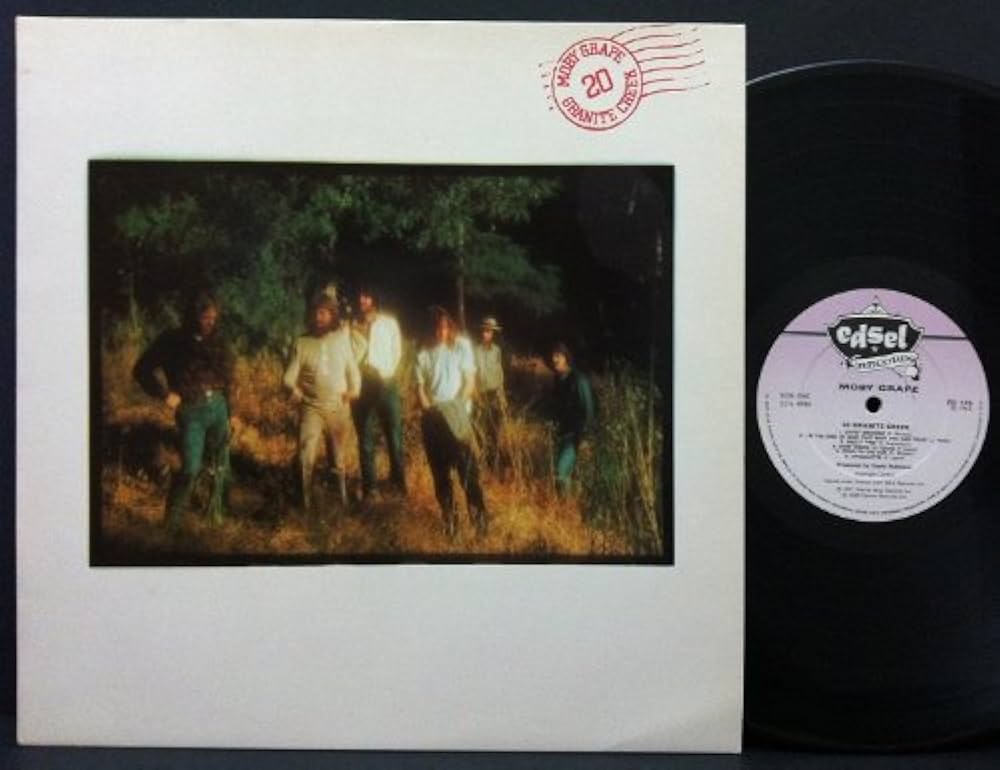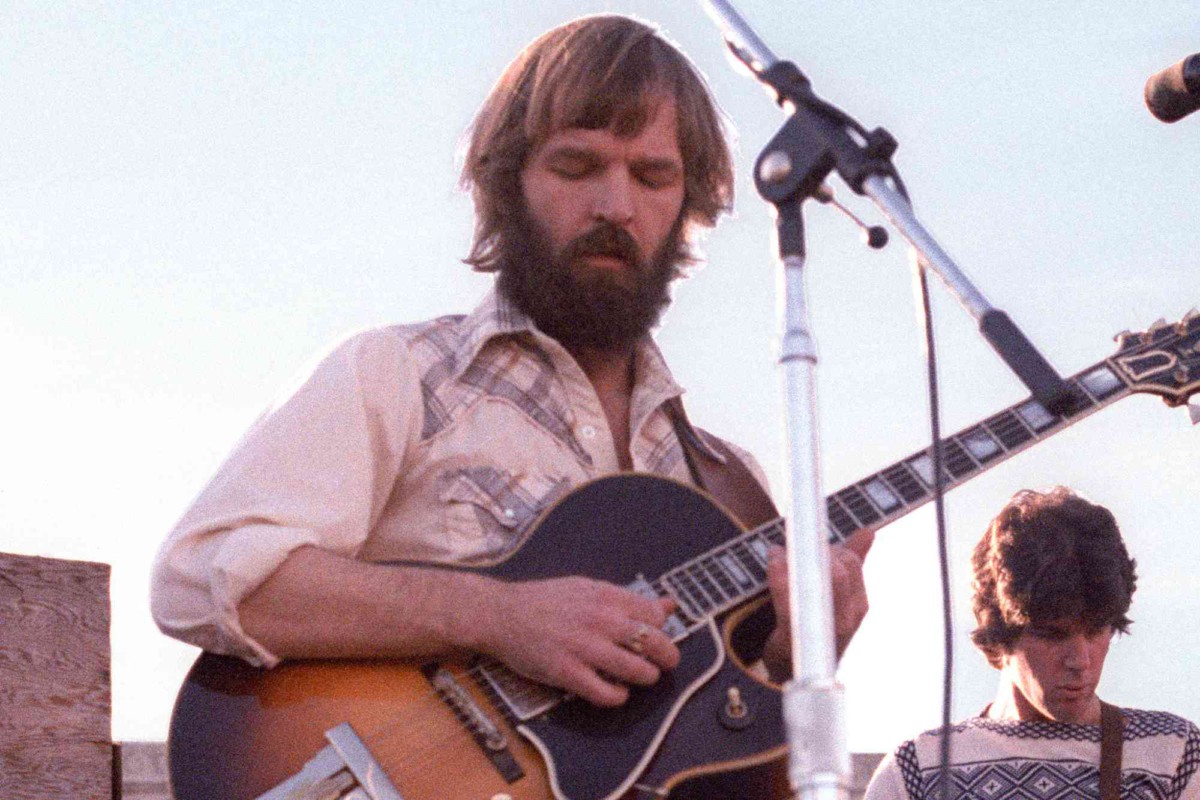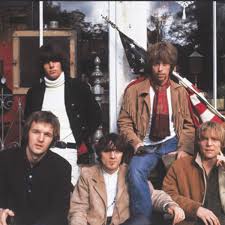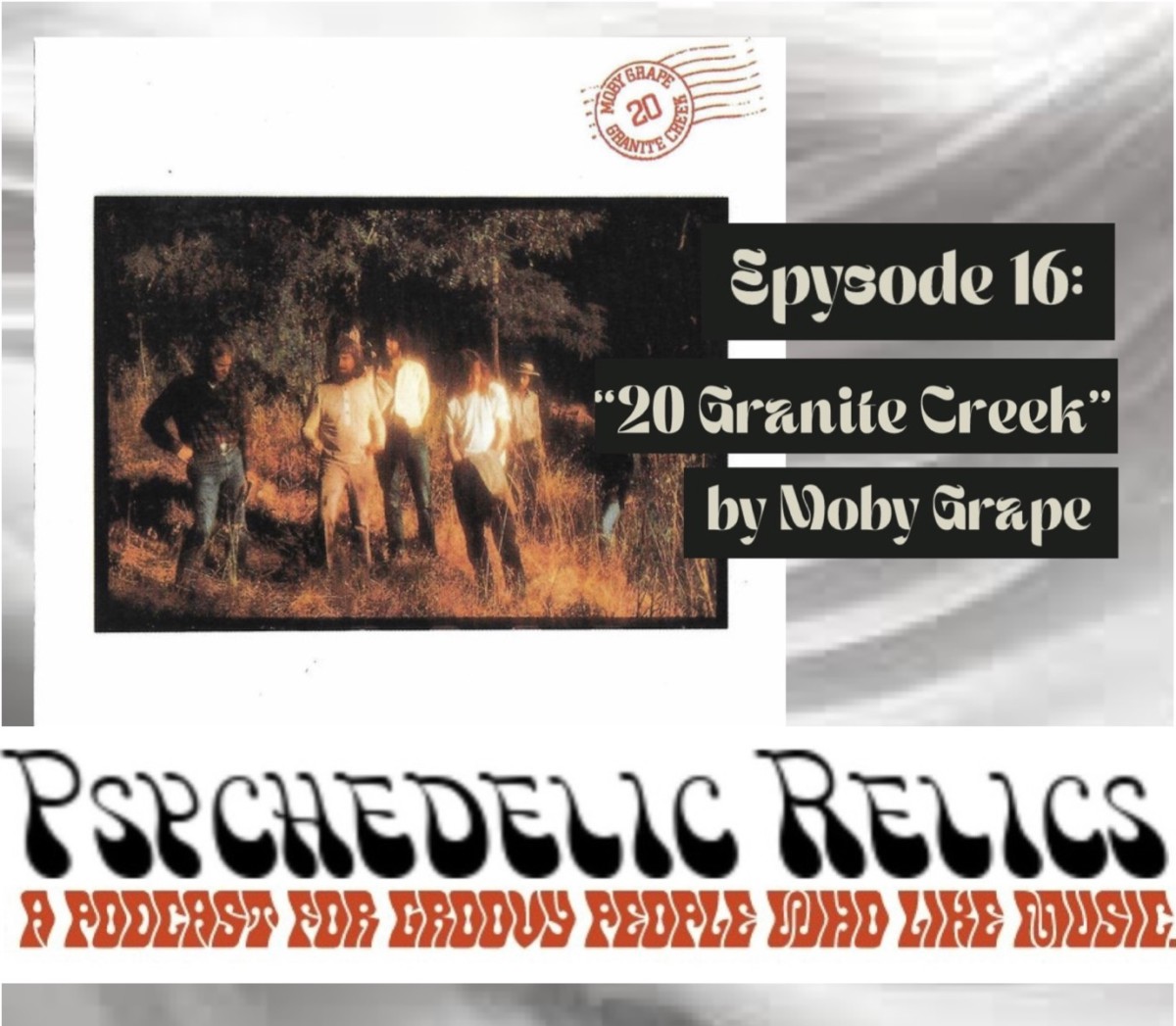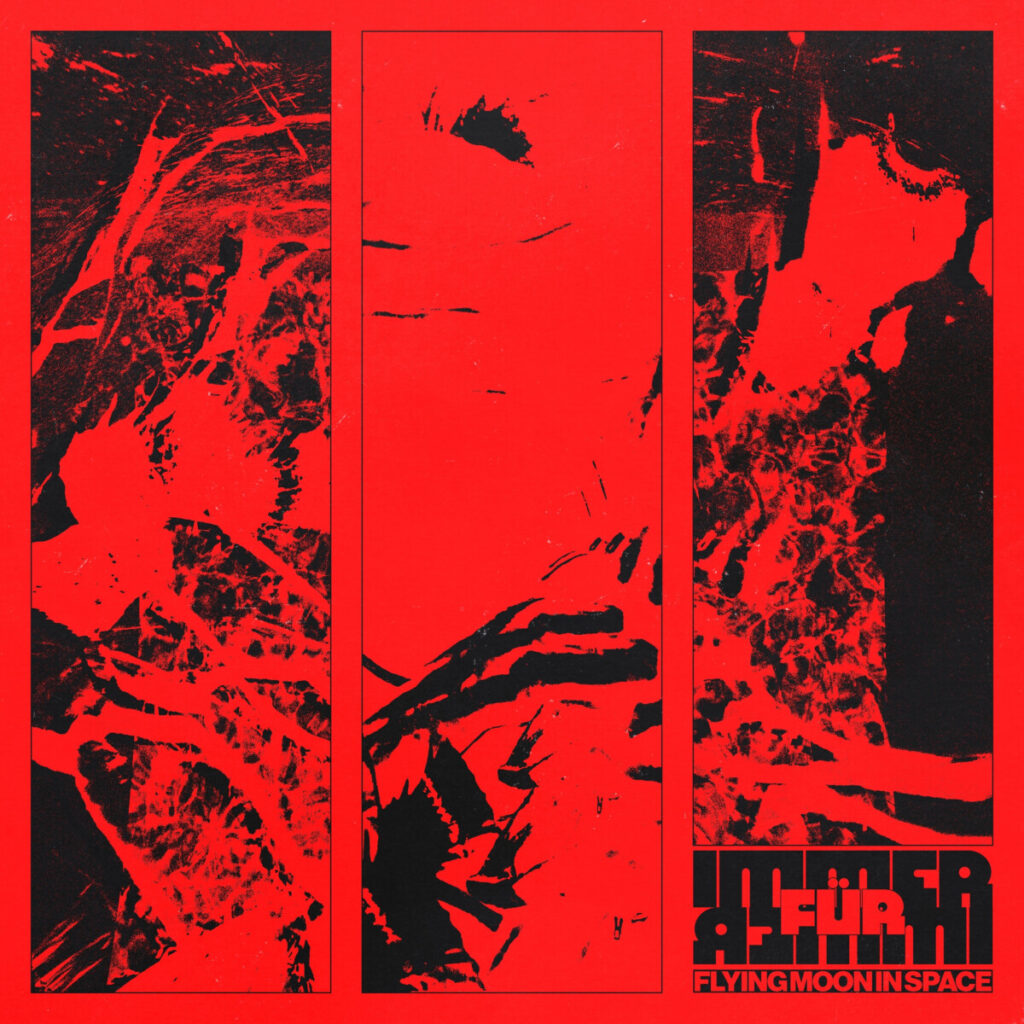Psychedelic Relics: 20 Granite Creek by Moby Grape
Psychedelic Relics: 20 Granite Creek by Moby Grape
Listen, my friends. Moby Grape often gets lumped into the “psychedelic” scene more so because of geography rather than the sound of their music. Forming in San Francisco in 1966, they, along with many other bands of the area, tended to get that tag even though their sound was more folk rock, country rock, or sometimes just flat-out rock, period. They are what I like to call “psych-adjacent.”
Maybe it’s their uniqueness that lends itself to the “anything goes” psychedelia mentality. With three guitarists, five singers, and five songwriters, they created a singular style unlike any of the other bands of the time, and maybe since. Their three guitarists played off each other perfectly in a style they dubbed “crosstalk.”
With three guitarists, five singers, and five songwriters, they created a singular style unlike any of the other bands of the time.
I had the pleasure of interviewing Moby Grape’s Don Stevenson for the program. Now, normally on my show, I highlight rare and obscure albums, which inherently means I’m often discussing artists that many listeners have never heard of. That’s not the case this time around as every self-respecting vinyl collector with a penchant for 60’s rock has some Moby Grape in their collection. They are not what I would consider a “fringe artist”, at least, not in these circles. So why feature them? Well, first off if you get the chance to interview an artist from one of your all-time favorite bands, you grab it. And when you find out that he shares the same opinion of 20 Granite Creek – that it is an underrated, oft-overlooked gem in their catalog then presto! You have yourself a worthy epysode of the program.
20 Granite was a chance for the band to reunite after a string of bad decisions, bad luck, and bad timing. Don said, “Warner Brothers was giving us the opportunity to reform after we’d totally screwed up”.
The story of the Grape has been well told with one of the strongest debut albums ever. In their infinite wisdom, their label decided to release five singles. Okay, that’s understandable. After all, the five songs they chose were all worthy. But as a marketing stunt, they released them all simultaneously which completely confused DJs across the country and backfired immensely.
Manager Matthew Katz also demanded a king’s ransom for the band to be filmed at the famous Monterey Pop Festival. Another boneheaded move, as it caused them to lose the prime spot on Saturday night, right before Otis Redding’s performance. Instead, they had to settle for the time slot no band wanted – the opening performance on Friday, while everyone was still rolling in. Guitarist Peter Lewis said, “Katz told them they had to pay us a million bucks to film us, so instead of putting us on Saturday night right before Otis Redding, they wound up putting us on at sunset on Friday when there was nobody in the place”. You wouldn’t know it from their performance, as famed producer Lou Adler, who was connected with the project, said that of all the interviews he’s given about Monterey since everyone talks about Grape’s set.
Of Monterey, Don told me “Katz was a jerk. We were supposed to be on Saturday night with all the big guys, Jimi Hendrix and all of them. They got pissed off at him and we ended up opening in obscurity when we were really, really on top of our game”.
Katz’s demand for money also meant their set was not included in the film or accompanying soundtrack. Even expanded reissues do not include the Grape’s legendary performance.
After Monterey, another gimmick followed for their second/third albums. Wow and Grape Jam were both released on the same day – buy one at full price, get the second for $1. Jam was exactly that – mainly improvisational jams that were mildly interesting. Wow had some good moments but was overproduced and was considered a step back from their debut.
1969 saw a return to form so to speak with the very solid release Moby Grape ‘69, though it was at a cost – the loss of Skip Spence. Skip’s mental health had been in decline culminating in the famous axe-to-the-hotel-door story. He did contribute one spectacular song to ‘69 titled “Seeing”. Don explained how this song was partially done but he was in poor health, so his bandmates finished it off for him, giving him sole writing credit. He told me “It’s just a powerful piece of music. It was important for us to finish it and get that on vinyl because it’s just a great song”.
After Moby Grape ‘69, the departure of Bob Mosley left the band as a three-piece. Only Don, Peter Lewis, and Jerry Miller were in attendance to complete the obligatory “contract fulfillment” album, Truly Fine Citizen. The band broke up before it was even released.
“We had to do another album”, Don said. “Part of our contractual obligation, so we did Truly Fine Citizen with just Peter, Jerry, and I. But even Peter took off later on”.
With the final release for their Columbia deal and the band split, this concluded the first part of the Grape story and is what led them to their 1971 reunion album.
With Skip’s health slightly improved, they moved into the house with the address of 20 Granite Creek, near Santa Cruz, CA, and got to work recording. Producer David Rubinson was key to getting them a new deal with Warner Bros. Don told me “David Rubinson went to bat for us. He sold them. He said ‘Look, this is a redemption story. Get these guys back here, they still have a lot of music in them, and we should probably record it and get it or someone else is gonna’”.
The opening track is a rocker of Bob Mosley’s titled “Gypsy Wedding”. “What’s a gypsy wedding? I don’t know, but I loved it”, Don said laughingly. “That’s Mosley at his best”.
More than 50 years later, Don could recite the poetic lyrics of Peter Lewis’s standout track “Apocalypse”. With lyrics as strong as this, it’s no wonder he still remembers them:
‘As I stood upon the meadow in the summer wind today/Watching while the long grass did its afternoon ballet/There came like mountain thunder, the Horseman angel’s cry/Apocalypse is now mankind, your time has come to die’
Don said “It’s prophetic. It’s like a biblical event.” As he recited the lyrics, he finished with “Excuse me, Peter, that is just…. beautiful”.
Opening side two is Skip Spence’s only contribution, the stunning “Chinese Song”. “Skip was in and out. He’d come and stay at the house a little while, then leave and come back. He wasn’t in great shape”, Don said. Of all the songs on this album we discussed, this is the one Don waxed poetic most of. “There’s not a phony note in it. Whatever it was supposed to be it is. It’s just really a great piece, yay Skippy!”.
Another highlight is Peter Lewis’s “Horse Out in The Rain”, which Don described as a “little masterpiece”.
The whole album is solid from top to bottom. It doesn’t match the quality of their debut, but then again, nothing ever really could. Don described it as “an evolution. If you listen to 20 Granite Creek, we’re better. I mean, we’re better musicians.”
Don and I both have the same opinion of 20 Granite Creek – that it’s tied with Moby Grape ‘69 as their second-best album. I give it a Farmer John rating of 9 hay bales out of 10.
After the album was released, they toured behind it extensively, even hitting Europe. But Don put it best: “Nobody really cared. It just didn’t take off. But at least the album is a fitting conclusion to that group and all the original members playing together”.
There were other reunions over the years, involving various incarnations of the band. But none of them included contributions from all five original members and though each had some moments, none of them were as strong as 20 Granite Creek
Members of the band went on to other projects and solo work over the years. Skip Spence passed in 1999 and sadly Jerry Miller passed just a few weeks after I interviewed Don.
After decades of battling Matthew Katz to get control of their name and product, we’ve started to see some archival material released. There are some cool live albums and a double LP of unreleased and rare tracks called The Place and The Time that I highly recommend.
Their story is long and strange. Writer Jeff Tamarkin once wrote “The Grape’s saga is one of squandered potential, absurdly misguided decisions, bad luck, blunders and excruciating heartbreak, all set to the tune of some of the greatest rock and roll ever to emerge from San Francisco. Moby Grape could have had it all, but they ended up with nothing and less.” I asked Don if this quote was accurate. Laughingly, he said “Uh, no. I’ve got friendships that have lasted over those years, and I have the respect of other people. Doors have opened because of that. So, you don’t end up with nothing, you end up with something that is not legendary…’legendary’ is not the right word, but something that gives you the proper respect in the musical circles where you can move in and move out and be invited in because of what happened. You know, we didn’t end up with the future we could have had as rock stars but then again, we had a great run. So, part of that is right, but it’s not all that bleak. It’s just the way it was meant to be”.
What I found really touching about our conversation was Don’s obvious love for these guys. He told me flat out “I still love all my band mates”. That love was on full display as Don shared his stories, talked about songs, recording, and touring. I really enjoyed our chat, it’s really a thrill for me to get to talk to someone I hold so much musical respect for.
If you’ve got a copy of Moby Grape in your collection, great. That’s a good start. I’d highly encourage you to seek out others in their discography, especially Moby Grape ‘69, and not sleep on 20 Granite Creek. Reunion albums tend to be hit-and-miss, this one is absolutely one of the better ones. And as a bonus, it’s not terribly hard to find or very expensive.
With each artist I interview I end with the same question: I ask them to imagine themselves in a record store today and they see a long-haired teenager flipping through the bins, pulling up a copy of the album we’ve just discussed. I asked Don “What would you say to that kid holding a copy of 20 Granite Creek?”. His answer was priceless: “Well, I’d ask him if he was a musician. If you don’t have to be, you probably shouldn’t be. But if you can’t help it, that’s not a bad record to listen to”. Well said Don, well said.
Farmer John is a musician and host of the audio podcast “Psychedelic Relics & Other Vinyl Treasures”. Each epysode (the “y” is on purpose) of the show features an under-the-radar album and includes interviews with artists and musicians connected with the project. “20 Granite Creek” is featured on the most recent epysode, #16, and includes the full interview with Don Stevenson, the story of the band’s formation, their demise, reformation, demise, reformation again…well, you get the idea. It also includes a track-by-track analysis of the album narrated by Don. Tune in, turn on, and drop by any podcast platform to give it a listen.
Related: Rock’s Mad Geniuses (Skip Spence)
Gallery
Recent Articles
Can Molly Mend Your Marriage?
•
February 16, 2026
Immer Für Immer by Flying Moon in Space–Album Review
•
February 13, 2026

Loading...
